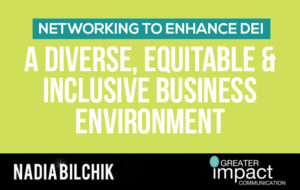 At this point, it had become widely accepted that companies committed to Diversity, Equity, and Inclusion benefit from a “diversity dividend” for a whole range of reasons, including gaining access to diverse markets and tap into different and often innovative perspectives.
At this point, it had become widely accepted that companies committed to Diversity, Equity, and Inclusion benefit from a “diversity dividend” for a whole range of reasons, including gaining access to diverse markets and tap into different and often innovative perspectives.
So, how does that relate to your career? The answer is if you can harness your networking skills to connect and engage with people of all ages, cultures, backgrounds, and types, you too will likely be the beneficiary of a “diversity dividend. Moreover, it can help propel your personal and professional journey to greater heights.
What Are The Advantages?
Just like growing your network gives you access, the more diverse people you know and the more genuinely inclusive you are, the more access you have. Expanding your network to include a broad range of ideas and perspectives and developing a team that mirrors your client and customer base gives you more career opportunities and expands your ability to influence and persuade others. And with a greater understanding of others and a broader range of experiences and perspectives, becoming a better leader will also be one of the benefits.
Keep in mind that the kinds of skills we bring to networking can help nurture a diverse, inclusive and equitable workplace and help grow our networks in meaningful and productive ways.
Diversity is Not Just About Ethnicity
Diversity covers various definitions, including gender, age, religious and socioeconomic background, personality styles, disability status, nationality, and military experience. But, as in meaningful networking, in which the aim is not just to collect business cards, effective networking to be truly inclusive is not just a matter of assembling a diverse set of connections.
As Layana Irvin, president of Coqual, a New York-based non-profit dedicated to Diversity and inclusion in the workplace, says, “words alone will not get the job done.”
What This Means
Consistently working to help colleagues, clients, and new connections feel included irrespective of who they are or identify themselves. As Claudia Brind-Woody says, it is nurturing the feeling among people not just that they are allowed to be there but that they are valued as well. Brind-Woody has spent her time at IBM emphasizing how fostering an inclusive corporate work environment is good for business and positive societal change. She and many others cite neurological research that shows our most productive, innovative, and collaborative times at work happen when we feel like we are a part of the team. When we feel included and respected, our bodies create hormones and healthy energy that raise our work performance.



